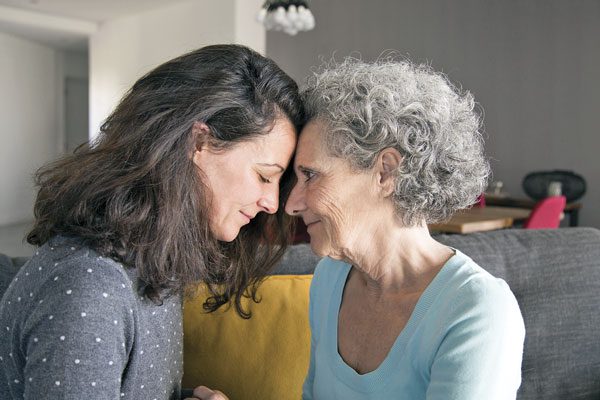
The Thanksgiving Day after my mother died, I sat at the table with a dozen of my closest family members. The youngest was my 22-year-old godson on his way to Iraq with the Marines. The eldest was my 91-year-old Aunt Vera, the last of my mother’s four siblings to still be living.
Everyone was worried about our Sean being wounded or killed. That was “the elephant in the room.” Aunt Vera was still living alone but showing signs of dementia and frailty, another “elephant in the room.”
While the head of the house said grace, “God, grant me the serenity to accept the things I cannot change, the courage to change the things I can, and the wisdom to know the difference,” I looked around the table, feeling those words in a new way. All of a sudden, I had the awareness that one of us at the table will be the first to die, and one will be the last. I cannot change that. I realized that I could be either, and a panic attack began to invade my body.
Platters and plates began to move around the table, and I shifted back to enjoy the present moment. Even if we all lived another year, I knew this day would never happen again. It would be my great loss to miss it.
Driving home hours later, I asked myself, “What if I’m in a car accident and I’m killed?” It happens. My older sister would have to take care of all my business, and she had no idea about what she needed to know. Then I wondered, “What if I’m alive but seriously injured?” She would be the first person the hospital would ask to make decisions about critical treatments, like a ventilator or feeding tube, invasive tests, a surgery, or moving me to a nursing home for the rest of my life. We’d never talked about it. I slowed down.
I set Valentine’s Day as a deadline to finish my Medical Directive that would give legal power to another person to voice my choices for critical medical treatment if I am ever hospitalized and not able to speak for myself, when death is in the room. It happens.
Before I signed the Directive, I called my sister and asked if she would be my Healthcare Power of Attorney. She gasped and said. “Loretta! You’re my baby sister. I don’t want you to ever die!”
I caught my breath, paused, and replied, “Then you can’t be my Power of Attorney. But I will add you to the document as an extra because I want you to be involved if my life is on the line. I will also put my choices in writing so there won’t be confusion, conflict, or fear about doing the right thing for me. I love you.”
One year later, I was invited to sit on the Ethics Committee at a large hospital in Chicago, where I participated for 17 years. Ethics is where the tough cases about patients on the edge of death with no one to make treatment decisions for them, or families disagreeing about treatments, were brought for discussion, and ideally, a solution. All of them were lingering in a coma, or on a ventilator, and the hospital could not stop treatment without a legal representative to approve the action or by acquiring legal guardianship, which is an expensive and lengthy process.
I learned how denial, defiance, and sheer lethargy for planning ahead got so many people on the receiving end of aggressive, futile, expensive treatments before they died. I want no part of that for myself or my loved ones. Like my sister, your loved ones never want you to die. They may “do everything” to keep you alive if you never tell them what matters most to you at the end of your life.
North of the Border, the legal forms for Medical Directives are free. Everything you need to know about advance care planning and forms, including a dementia directive, for the US is at https://compassionandchoices.org, and for Canada at www.dyingwithdignity.ca.
Not in Mexico. Here, a Notario Publico must produce and authorize a bilingual document, and it costs around 4000 pesos. It’s recommended that you choose a person who can be with you in the hospital to advocate for you with the medical team, and one or two additional surrogate decision makers. The hospital will want to know “who’s the person with the papers.” Having someone NOB on the phone or a What’s App video may or may not be enough, though it is better than having no advocate.
Many expats tell me they don’t have a person to trust with this responsibility. Some of our local doctors will agree to take responsibility. I suggest you write out what matters most to you, quality of life or quantity, and give copies to all the people who will be involved in your medical care.
If you own property in Mexico, you likely need a will in Mexico. Consult a Notario Publico.
Preparing to be the first of my circle to die was actually pretty easy. Completing a medical directive and a last will and testament ultimately took less time and money than it did to plan a vacation. It wasn’t as much fun, and there were no photos to share, but when I signed the papers, the sense of relief I felt was worth every bit of thought and time it took to complete them.
The Notario made enough copies to give one to everyone who will be involved in my demise, which one day will arrive. Though I’m good to go today, I’m planning to stick around a while longer so I can update my directives a few more times.
The poet Rumi wrote, “Life gives us two great gifts, love and death. Mostly they are passed on unopened.” Completing advance directives helps us make friends with our mortality, and it is a gift to those who love us most.
Preparing to be the last to die is a whole other story. Read it next month.
- It Happens - November 30, 2025
- It Happens - October 30, 2025
- The Power of Candlelight - September 29, 2025


 Discover trusted local services and hidden gems with our easy-to-use online directory.
Discover trusted local services and hidden gems with our easy-to-use online directory.

